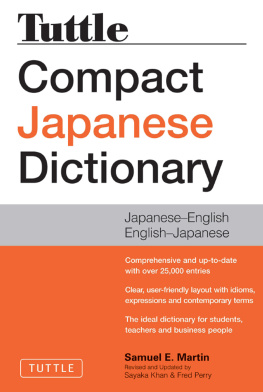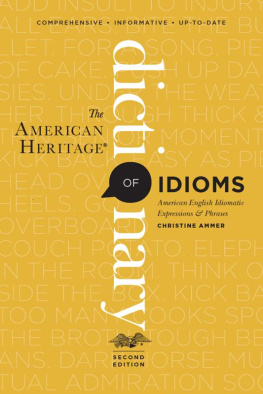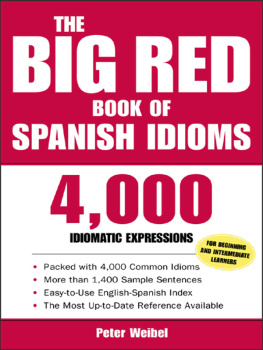McGraw-Hills Dictionary of American Idioms and Phrasal Verbs
Richard A. Spears, Ph.D.


Copyright 2005 by The McGraw-Hill Companies, Inc. All rights reserved. Manufactured in the United States of America. 0071486852 The material in this eBook also appears in the print version of this title: 0071469346. 0071486852 The material in this eBook also appears in the print version of this title: 0071469346.
All trademarks are trademarks of their respective owners. Rather than put a trademark symbol after every occurrence of a trademarked name, we use names in an editorial fashion only, and to the benefit of the trademark owner, with no intention of infringement of the trademark. Where such designations appear in this book, they have been printed with initial caps. McGraw-Hill eBooks are available at special quantity discounts to use as premiums and sales promotions, or for use in corporate training programs. To contact a representative please e-mail us at bulksales@mcgraw-hill.com. ("McGraw-Hill") and its licensors reserve all rights in and to the work. ("McGraw-Hill") and its licensors reserve all rights in and to the work.
Use of this work is subject to these terms. Except as permitted under the Copyright Act of 1976 and the right to store and retrieve one copy of the work, you may not decompile, disassemble, reverse engineer, reproduce, modify, create derivative works based upon, transmit, distribute, disseminate, sell, publish or sublicense the work or any part of it without McGraw-Hills prior consent. You may use the work for your own noncommercial and personal use; any other use of the work is strictly prohibited. Your right to use the work may be terminated if you fail to comply with these terms. THE WORK IS PROVIDED "AS IS." McGRAW-HILL AND ITS LICENSORS MAKE NO GUARANTEES OR WARRANTIES AS TO THE ACCURACY, ADEQUACY OR COMPLETENESS OF OR RESULTS TO BE OBTAINED FROM USING THE WORK, INCLUDING ANY INFORMATION THAT CAN BE ACCESSED THROUGH THE WORK VIA HYPERLINK OR OTHERWISE, AND EXPRESSLY DISCLAIM ANY WARRANTY, EXPRESS OR IMPLIED, INCLUDING BUT NOT LIMITED TO IMPLIED WARRANTIES OF MERCHANTABILITY OR FITNESS FOR A PARTICULAR PURPOSE. McGraw-Hill and its licensors do not warrant or guarantee that the functions contained in the work will meet your requirements or that its operation will be uninterrupted or error free.
Neither McGraw-Hill nor its licensors shall be liable to you or anyone else for any inaccuracy, error or omission, regardless of cause, in the work or for any damages resulting therefrom. McGraw-Hill has no responsibility for the content of any information accessed through the work. Under no circumstances shall McGraw-Hill and/or its licensors be liable for any indirect, incidental, special, punitive, consequential or similar damages that result from the use of or inability to use the work, even if any of them has been advised of the possibility of such damages. This limitation of liability shall apply to any claim or cause whatsoever whether such claim or cause arises in contract, tort or otherwise.
About This Dictionary
All languages have phrases that cannot be understood literally and, therefore, cannot be used with confidence. They are opaque or unpredictable because they dont have expected, literal meaning.
Even if you know the meaning of all the words in a phrase and understand all the grammar of the phrase completely, the meaning of the phrase may still be confusing. A phrase or sentence of this type is said to be idiomatic. This dictionary is a collection of the idiomatic phrases and sentences that occur frequently in American English. Many of them occur in some fashion in other varieties of English also. Many overlapping terms have been used to describe the idiomatic phrases included here: verbal collocations, idioms, idiomatic expressions, clichs, proverbs, set phrases, fixed phrases, phrasal verbs, common phrases, prepositional verbs, and phrasal/prepositional verbs. They all offer the same kinds of problems to the speaker and writer of English.
They are unclear because the meaning of the phrase is not literal or predictable. Phrasal verbs, also called two-word verbs, are idiomatic expressions because the second element of the verb (the adverb or preposition) is not necessarily predictable. For instance, why the word up in call up a friend?. Why not say call on a friend or call in a friend?. Actually, those are three separate, unpredictable combinations, and they each mean something completely different. For example, you can call up a friend on the telephone, call on a friend to have a visit, and call in a friend to come and help you with something.
Although there are some entries that are very casual or informal English, slang and idioms should not be confused. Some slang is also idiomatic, and some idioms are also slang, but generally they refer to different aspects of language. There are a few slang terms in this dictionary, because they are also fairly commonly known idioms.
GOALS OF THE DICTIONARY
A major goal of this dictionary is to make certain that each definition of a phrase illustrates the meaning of the phrase and matches it in syntax. The major exceptions are definitions that begin with "a phrase" or "an expression." Similarly, the examples for each sense must match the definition in meaning and syntax. The best use of the entries is to study the entry head, definition, and example carefully.
Look for the meaning that is common to all three. If the diligent user can see the elements of meaning shared by the entry phrase, the definition, and the example(s), the dictionary entry has done its task well. A second goal is to provide the learner with enough information about the many forms that an idiom might take to allow the user to recognize it in a variety of contexts and to be able to use it in speech and writing. A third goal is to make the details accessible to the learner. Idiomatic expressions and their variants are complex and unpredictable. There are many synonyms and near synonyms.
General cross-referencing in the body of the dictionary will help users find synonymous phrases. The Phrase-Finder Index provides a powerful tool for locating entry forms embedded in other entries and partially remembered phrases. The form of the entry is quite straightforward, consisting of entry, definition, comments (if any), and examples. Senses are numbered and may include variants in addition to those found in the entry head. A minimum of abbreviations and symbols are used, and these are explained in the section Terms and Symbols.
WHO CAN BENEFIT FROM THIS DICTIONARY?
The dictionary will prove useful for native speakers who are looking for synonymous idiomatic phrases.
WHO CAN BENEFIT FROM THIS DICTIONARY?
The dictionary will prove useful for native speakers who are looking for synonymous idiomatic phrases.
Many phrases can be expressed in a variety of ways, and this dictionary, through cross-referencing, can lead the native speaker to equivalent forms with the same or similar meaning. The index provides a means for a writer to find the most appropriate phrase for a given purpose. Native speakers can find most of what they want by looking up words representing key ideas in the index and following the references to phrases in the dictionary itself. Likewise, near-native speakers who need help with phrasal verbs and common idiomatic phrases will find this reference very useful. Speakers and writers trained in British English will find this dictionary a good reference for checking on the American form and meaning of expressions previously encountered in British English. The format of the dictionary is designed to provide the information needed by learners who are attempting to read and write conventional American English.









 Copyright 2005 by The McGraw-Hill Companies, Inc. All rights reserved. Manufactured in the United States of America. 0071486852 The material in this eBook also appears in the print version of this title: 0071469346. 0071486852 The material in this eBook also appears in the print version of this title: 0071469346.
Copyright 2005 by The McGraw-Hill Companies, Inc. All rights reserved. Manufactured in the United States of America. 0071486852 The material in this eBook also appears in the print version of this title: 0071469346. 0071486852 The material in this eBook also appears in the print version of this title: 0071469346.